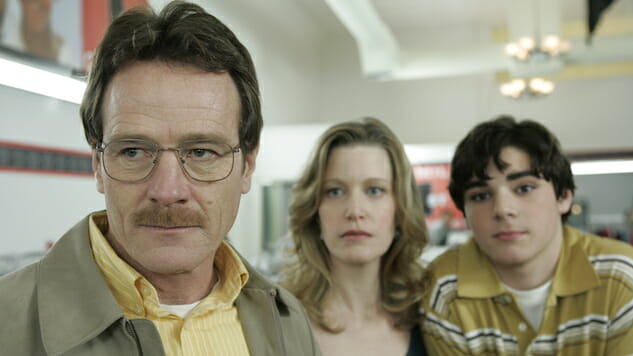Breaking Bad Turns 10: A Look Back at One of the Best TV Dramas of All Time
Photo: Doug Hyun/AMC TV Features Breaking Bad
Breaking Bad was my event TV. My parents taped Twin Peaks and ate terrible take-out while deciphering David Lynch’s mysteries; I watched the end of Breaking Bad in a crappy off-campus apartment with the dorkiest group of nerds ever to grace a college. One went on to become a quantum physicist. It was basically Young Sheldon.
Breaking Bad, which turns ten this year, was a social one. Its kickass pilot, which aired Jan. 20, 2008 and is still taught in TV writing classes, teased with shocking and humorous imagery (a frumpy dad with a gun in his tighty-whities?) before delivering the strong characterization and inventive plotting to back them up. The series even became Guinness World Records’ highest-rated TV series of all time—and they used Metacritic instead of Rotten Tomatoes, so you know it’s right.
How has the tragic ballad of Walter White weathered its title over the years? If the current TV landscape is anything to judge by, it’s a proud grandfather, looking over its progeny with the same glee and gentle judgement of any overachieving patriarch. Breaking Bad may not have set the paradigm of unlikable anti-heroism in pop drama, but it certainly put the “pop” into the designation.
Some argue that The Wire is TV’s best drama of all time; others stand up for Mad Men or The Sopranos, the latter of which has the benefit of being so important historically that it begins many textbooks’ modern TV eras. But Breaking Bad made its bones quickly, publicly, and with plenty of pizzazz. It entered the TV landscape with just a few episodes of tonally-questionable wobbling—the balance-finding of an ambitious acrobat searching for the tightrope’s center—and stuck the landing on the remaining five seasons. Who cares if the first season’s DVD case called it a dramedy? America knew what it was immediately, even if we didn’t know exactly where it was going.
The show’s destination is one of its great selling points. Too often, TV recommendations come couched with caveats: “Oh, it’s great, but skip Season Seven where they lose the showrunner and everything turns to shit,” or “The first season doesn’t really count because it’s a totally different show after that.” No, when you tell someone to watch Breaking Bad, you tell them to watch Breaking Bad. All of it. Start to finish. No exceptions—as if anyone who started the series would ever tap out without knowing how it concluded.
Breaking Bad had the luxury of Vince Gilligan and his team knowing when to pull the plug, and AMC’s cooperation not to turn the show into a swollen piggy bank. That meant five seasons made, five seasons enjoyed. It took the late 1990s/early 2000s mix of serialization and episodic TV and made it the medium’s version of the Olympic triathlon: Nobody was exactly sure how they were so good at combining those things, or what exactly that combination was, but we all sure watched the hell out of it while hoping and praying for redemption that wouldn’t come.
The show’s grand reveal—metered out over a few seasons and solidified in the series finale— wasn’t just well-received; it opened up the floodgates for executives and networks to trust audiences with unlikable, unredeemed, and unapologetic lead characters on a major scale. They realized if you build something as well as Breaking Bad, audiences will be more accepting of a sour ending that fits than a schmaltzy one that infuriates. The Leftovers’ ambitious storytelling and Rectify’s bittersweet realism both learned from their predecessor’s brave ability to end on its own terms, in its own way. That Breaking Bad was able to sprinkle in some levity throughout just added to the populism. People love a dash of absurdity in their dramas (how do you think soap operas are still a thing?), so some pizza-tossing, breakfast-loving, identity-changing silliness only made the potent punches that much stronger.
In the ten years since Breaking Bad began and the five years since it ended, the show remains at the top of the ratings charts among—and this is key, folks—critics and audiences. That combo is something that most prestige TV never gets. Even Game of Thrones pisses off its base every once in a while. Breaking Bad’s great strength was telling a sensational story with enough morbidity that we couldn’t look away and enough cleverness that we never thought twice about why. Aside from the show’s brilliant look, aired out in the desert heat, its cast was both familiar and startling—as perfect for water cooler talk as it was for the “For Your Consideration” conversations that arise when actors step outside their typecasting.
It trained the untrained eye to prestige TV and took that eye on a delectable journey through Walter White’s Fucked-Up Methamphetamine Factory, using its mastery over storytelling (I truly believe the writers could escape cement shoes with just their words) to direct its audience’s attentions elsewhere. When the story is guaranteed to be satisfying, it frees up some attention and expectation towards aesthetics, acting, and scale. Breaking Bad was the show that got many of us into thinking about TV because it, like the first cut of quality steak or the first glass of decent red, challenged viewers’ ideas of what their favorites could be. Breaking Bad may not be your personal pick for the best TV drama of all time, but its complex consistency, wide availability, and gossip-ready quality cemented it as the TV show that got many of us (back) into TV.
Read Paste’s ranking of all 62 episodes of Breaking Bad here.
Jacob Oller is a writer and film critic whose writing has appeared in The Guardian, Playboy, Roger Ebert, Film School Rejects, Chicagoist, Vague Visages, and other publications. He lives in Chicago, plays Dungeons and Dragons, and struggles not to kill his two cats daily. You can follow him on Twitter here: @jacoboller.